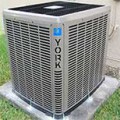Utilities are one of those expenses that you don’t think much about until the bill comes and you
can’t believe you used that much energy. Simple things like turning on the lights in the morning,
taking a shower, washing dishes, and so much more use energy that you have to pay for every
day. However, there are a lot of ways you can reduce your utility bills and save money each
month.
Create Zoned Heating and Cooling
If you live in a larger home you probably have rooms in your house that you don’t always use
such as a guest bedroom or extra bathroom. If you are rarely spending time in these rooms,
they don’t necessarily need to be kept at a temperature you are comfortable in. instead you can
close the doors and vents in these rooms so that you aren’t wasting energy heating or cooling
them. This is called zoned heating and cooling because you are creating active and inactive
zones within your house. If your heating and cooling systems do not have to work as hard as
they normally would to regulate the temperature in rooms you don’t use.
Keep Your Vents Clean
Keeping your vents clean and changing the filters regularly is another important way to make
sure that your heating and cooling systems are not being overworked. If you don’t take these
measures, the vents can get clogged and blocked by dust and debris and they won’t be able to
work as efficiently so you should change them at least once a month. In between changing
them, you can use a vacuum to clear out any dust from the filter and vent itself.
For the same reason, you need to make sure nothing is blocking any of your vents, both inside
and outside. Any furniture that could be blocking a vent should be moved to another spot, and
trees and pushes on the exterior should be trimmed if they’re blocking an outside vent. You
want the airflow to be unobstructed so that your heating and cooling systems don’t have to work
as hard. This will save energy and in turn save you money.
Be Smart About The Dishwasher
Doing dishes is a pain, but throwing everything in the dishwasher and running it every night can
end up costing you way more than you think. However, using a dishwasher generally saves a lot
of water in comparison to hand washing. Most dishwashers will use less than 5 gallons of water
for each cycle, but handwashing can use up to four times that amount.
To get the most out of your dishwasher you want to make sure it is completely full before
running it, which will also help the dishes get cleaner. You can also turn off the “heat dry” option
before you start it. Instead, just open your dishwasher when it is finished and let the dishes air dry. If you run the dishwasher overnight, you can open it up in the morning and they’ll dry
while you are at work for the day.
Insulate and Seal
When it is cold outside, heat is always going to leave your house if it finds a way to. You can
reduce the amount of hot and cool air that leaves your home by making sure everything is
insulated and sealed properly.
If you have an attic this is a very common place for air to escape from, so insulating it can make
a huge difference. Additionally, your floors, walls, and crawlspace should all be insulated
properly. After you have insulated your home, make sure other areas are sealed. If you place
your hand next to the window and the air feels cold you may need to add weatherstripping or
caulk to stop this airflow. If you don’t feel comfortable tackling this project on your own, an
experienced contractor will help you.
Jenn Walker is a freelance writer, blogger, dog-enthusiast, and avid beach goer operating out of
Southern New Jersey. She writes for a bankruptcy lawyer in Philadelphia.











Leave a Reply